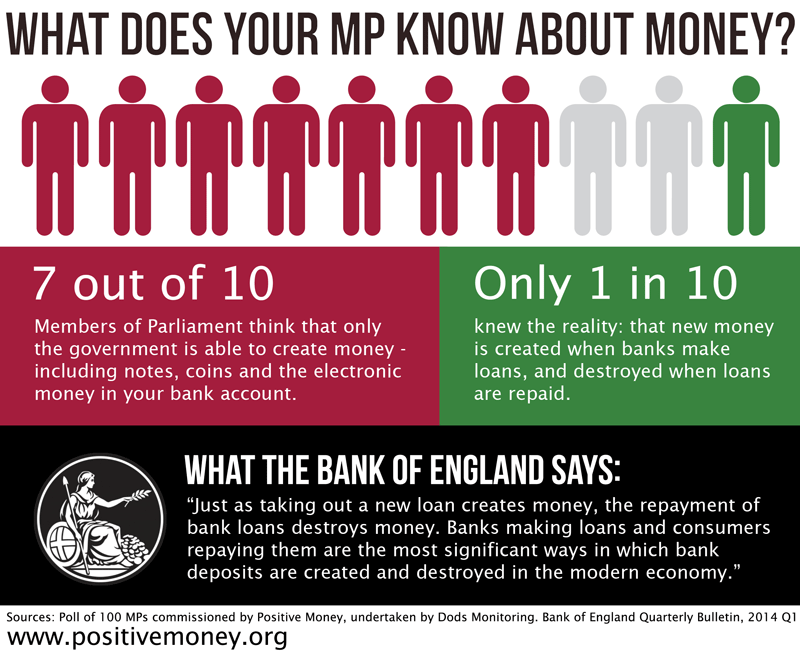POLL RESULTS: Only 1 out of 10 MPs understand that banks create money

MPs lack basic knowledge about the fundamentals of money, leaving them ill-equipped to understand the impending dangers of another house price boom or a second credit bubble, according to an exclusive Dods Monitoring poll commissioned by Positive Money, the campaign body calling for fundamental reform of our money and banking system.
When asked questions about who creates the nation’s money in the UK, nearly three quarters got the wrong answer. 71% of MPs believed that only the government has the power to create money. In reality, the government now only creates coins and notes, which make up just 3% of all the money in the economy. The other 97% of money exists as bank deposits – the electronic numbers in your bank account). This type of money is created by high-street banks – not by the government.
Just over 1 in 10 MP accurately understood that banks create new money every time they make a loan, or that money is destroyed whenever individuals or businesses repay loans.
Ben Dyson, founder of Positive Money, said: “MPs have no chance of understanding the house price bubble unless they know these basic facts about money. The financial crisis was caused by banks that created too much money and lent it recklessly. We’re now in danger of repeating the same mistakes.”
MPs should read the Bank of England’s report on money creation
MPs’ understanding of how money is created is in direct contradiction to a Bank of England paper released in March 2014. The article “Money creation in the Modern Economy” says:
“[The] majority of money in the modern economy is created by commercial banks making loans. …
When a bank makes a loan, for example to someone taking out a mortgage to buy a house, it does not typically do so by giving them thousands of pounds worth of banknotes. Instead, it credits their bank account with a bank deposit of the size of the mortgage. At that moment, new money is created. …
Just as taking out a new loan creates money, the repayment of bank loans destroys money.”

MPs unable to prevent another financial crisis
Without understanding that banks create new money whenever they make loans, MPs are ill-equipped to appreciate that:
The boom running up to 2007 was fuelled by the creation of new money by high street banks. Over £1 trillion of new money was created as the banks went on a lending spree.
The housing bubble is driven by money creation by banks, rather than the scarcity of housing. The £22 billion of new mortgage lending provided in 2013 resulted in £22 billion of new money being creating by the banks and pumped into the housing market.
Governments can create short-term economic growth by encouraging households to go further into debt, because every new loan from a bank creates money. But this ultimately increases the risk of another financial crisis.
If households try to pay down their debts, money disappears from the economy. This could potentially lead to a recession.
Educating MPs is a Priority
It is essential that MPs understand that the power to create money has shifted to the same banks that caused the financial crisis. We’re launching a campaign to educate MPs about the way money is created, and why it matters.
[yellow_box]Does your MP understand money? Email your MP now![/yellow_box]
Notes on the Poll
One hundred MPs were polled through Dods Monitoring in July 2014. MPs were asked to read a number of statements and indicate whether they were true or false. They could also select “Don’t know”.
In response to the statement “Only the government – via the Bank of England or Royal Mint – has the authority to create money, including coins, notes and the electronic money in your bank account.”, 71% said this was true, 20% said it was false (the correct answer) and 9% said they didn’t know. There was no significant difference between the parties.
In response to the statement “New money is created when banks make loans, and existing money is destroyed when members of the public repay loans.”, only 12% of MPs gave the correct answer: true. 64% of MPs said this was false, while 24% said they didn’t know.
Total responses came from: 39 x Conservatives; 45 x Labour; 10 x Lib Dems; 6 x Others.
The full results can be found here.